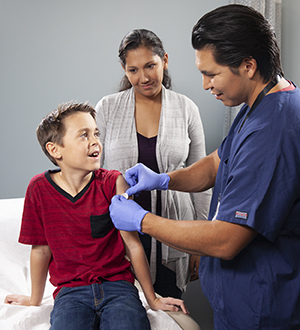Measles
Measles is an infection of the lungs that spreads very easily. It's caused by a virus. It usually spreads through droplets from coughs or sneezes of someone with the virus. Direct contact with fluids from the nose or mouth of an infected person can also spread the virus. An infected person can spread it from 4 days before the rash begins and for 4 days after it appears. In a person who is not immune to measles, the symptoms happen about 7 to 14 days (most commonly at around 2 weeks) after coming in contact with a person with the virus.
Who is at risk for measles?
Those most at risk for measles are:
-
Children and adults who never had the measles vaccine.
-
Infants too young to get the vaccine (under 1 year of age).
-
People with weak immune systems, even if they’ve been vaccinated against measles.
-
Adults vaccinated before 1968 who were given an inactivated (killed) measles vaccine or a measles vaccine of an unknown type. This vaccine was used between 1963 and 1967 and was not effective.
What are the symptoms of measles?
Early symptoms of measles include:
The red spots of the rash appear 2 to 4 days later. The rash often starts on the face and then spreads to the rest of the body.
How is measles diagnosed?
Your doctor can often diagnose measles based on your child's symptoms. Lab tests can confirm the diagnosis.
How is measles treated?
There is no specific treatment for measles. It includes fluids, rest, and medicines for fever or discomfort. Your child may need:
-
To be kept away from people, especially if they're not vaccinated.
-
Medicine for fever.
-
Antibiotics for bacterial infections if they develop. If your doctor prescribed antibiotics, give them to your child as directed. Do not stop giving them just because your child feels better. The full course of antibiotics needs to be taken.
-
Vitamin A, if recommended by your child's doctor. In some children, it can reduce how severe the illness might become and lower the chance of serious problems. Vitamin A does not prevent measles. It is not a substitute for vaccination.
-
A stay in the hospital if problems develop.
What are possible complications of measles?
Most children recover with no lasting effects. But measles can lead to serious problems or even death. Problems caused by measles can include:
-
A middle ear infection.
-
Infection of the lungs (pneumonia).
-
Infection of the upper airway with trouble breathing and cough (croup).
-
Diarrhea.
-
Infection of the brain (encephalitis).
-
Death.
How can measles be prevented?
 |
| Vaccination helps protect your child from measles. |
The measles vaccine is part of the routine immunizations advised for children. Children should be vaccinated for measles with two doses:
For those who have not been vaccinated, vaccination up to 3 days after exposure to measles may prevent or reduce the severity of the disease.
When to contact your child's doctor
Contact your child's doctor right away if you suspect measles.
Call 911 if your child:
Online Medical Reviewer:
Barry Zingman MD
Online Medical Reviewer:
Marianne Fraser MSN RN
Online Medical Reviewer:
Sabrina Felson MD
Date Last Reviewed:
3/1/2025
© 2000-2025 The StayWell Company, LLC. All rights reserved. This information is not intended as a substitute for professional medical care. Always follow your healthcare professional's instructions.